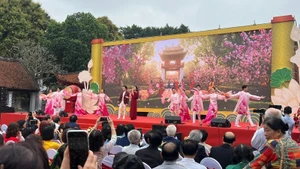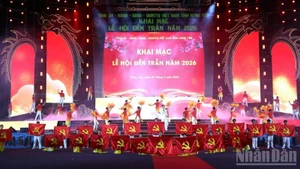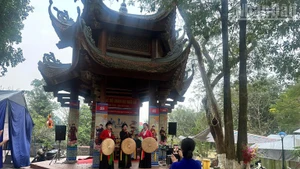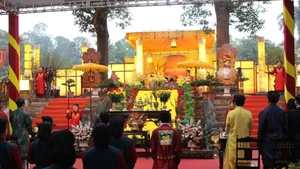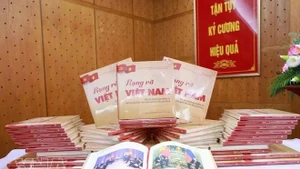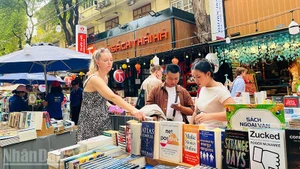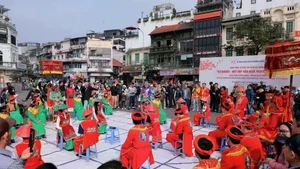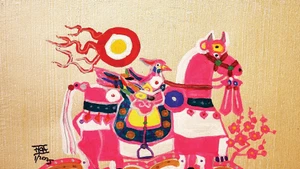She is the author of two books: The History of Vietnamese script (1615 - 1919)” — which has been praised as "the most comprehensive book on this subject" — and “100 Questions About the History of Vietnamese script”. She granted an interview on Weekly Publication of Nhan Dan Newspaper, sharing about her discoveries and insights into the process of the formation and establishment of Vietnamese script, a distinctive value in Vietnamese culture.
 |
| Dr Pham Thi Kieu Ly |
The path of creativity and refining a useful tool
Q: From your research, what are the distinctive features in the process of forming and perfecting the system of writing Vietnamese sounds using the Latin alphabet?
A: We need to place the beginning of the creation of the Vietnamese alphabet within the context of the broader movement of missionary linguistics. When European missionaries were sent to spread Christianity in the Americas, Asia, and Africa, they needed to learn local languages and began recording the sounds and compiling the grammar of these languages using the Latin alphabet.
Starting in 1615, when the Jesuit missionaries first arrived in the central and southern region of Vietnam, they began learning Vietnamese from the locals. Francisco de Pina, a Portuguese missionary who compiled the first Vietnamese vocabulary in 1619, had asked Vietnamese speakers to speak Vietnamese sounds aloud so he could transcribe them using Portuguese letters. Alexandre de Rhodes, a missionary from Avignon, learned Vietnamese from a 13-year-old child, according to his own records. On one occasion, he asked his servant to buy fish but received a basket of eggplant instead! He realised that he had mispronounced the word. On another occasion, he instructed his servant to go chop bamboo, but the children in the house ran in panic, thinking the priest had told them to chop the children! The challenge missionaries faced when learning Vietnamese was the transition from a stress-based language to a local language with tonal marks, resembling a musical score. However, overcoming these difficulties, Alexandre de Rhodes compiled a Vietnamese grammar and published it along with a Vietnamese-Portuguese-Latin dictionary in Rome in 1651.
Q: Along with the ups and downs of the nation's history, the Vietnamese alphabet also has a unique "fate" and a distinct status, doesn't it?
A: Alongside the establishment of a new education system with the introduction of French-run schools, the Vietnamese script was regarded as the foundation for the formation and development of journalism and publishing in Vietnam by the Vietnamese themselves as early as the late 19th century. We surely remember the first edition of Gia Dinh Newspaper, which was published in 1865 in southern Vietnam. After that, many Vietnamese newspapers played key roles in promoting the Vietnamese script and educating the public. The status of the Vietnamese script continued to be affirmed through the Duy Tan Movement (1906-1908) and the Dong Kinh Nghia Thuc School (1907), which advocated teaching the Vietnamese script and using it to spread knowledge among the common people to "enlighten the people, strengthen the national spirit". The National Language Promotion Association from 1938 to 1945 helped spread the Vietnamese script to hundreds of thousands of people. Additionally, the Vietnamese script gained an absolute dominance in literature, especially through the New Poetry Movement and the Critical Realist Movement (1930-1945), which brought together poets and writers who created entirely new works in the Vietnamese script. After Vietnam regained independence in 1945, the Provisional Government of the Democratic Republic of Vietnam launched a nationwide literacy campaign and organised lessons in the Vietnamese script for people of all social classes and ages.
My research shows that the Vietnamese script acted as a bridge connecting Vietnam to the modern world, serving as the "hinge" for cultural renovation. The role of the Vietnamese script has gradually evolved from a tool for Western missionaries to learn Vietnamese into a medium of communications and education between Western missionaries and Vietnamese seminarians, and eventually becoming a tool for disseminating scientific and social knowledge to the public and transforming into the official written script.
Unforeseen results and desires.
Q: Could it be that the impact and increasing status of the new writing system were perhaps beyond the imagination of the generations of Western missionaries and the French colonial government in Vietnam?
A: The training of missionaries necessarily included learning Latin. However, since Latin was very difficult to learn, the French bishops allowed Vietnamese seminarians to learn how to write Vietnamese using the Latin alphabet (quoc ngu). This was considered a stepping stone to make learning Latin easier. We believe that if it were not for the political-social and educational upheavals in Vietnam, the fate of the Vietnamese script would have been similar to the approximately 140 writing systems that were forgotten, created by the Jesuit missionaries for indigenous languages around the world. When the process of invasion and colonisation occurred in Vietnam, indeed, the change in the writing system led to a rupture in written language and, more broadly, in culture. The Vietnamese people had to face the transformation of documents and methods of learning. However, this issue must be considered in specific stages and from various perspectives.
When comparing the fate of the Vietnamese script with cases in China, Japan, or more closely, in Laos and Cambodia, we can observe that the adoption of the Vietnamese alphabet as the official writing system was the result of two parallel forces: the French colonial rulers' desire to make learning Vietnamese easier and to bring the Vietnamese and French cultures closer together, alongside the desire of the Vietnamese intellectual class, who saw the Vietnamese alphabet as a tool for raising the people's education level and fostering national spirit.
The advantage of the Vietnamese script is that it is easy to learn and remember. A learner can become literate in just three months, while it would take 10 years to master Chinese characters under the old educational system. The benefit of this new script lies in the reduction of learning time compared to ideographic characters. As a result, users of the Vietnamese script could spend more time absorbing new scientific knowledge in schools. However, it is also important to emphasise that writing is merely a tool for transmitting knowledge. The more modern educational programmes, along with the explosion of journalism and the publishing industry, allowed progressive Vietnamese thinkers to access new ideas and knowledge through the new writing system.
In my opinion, it was the new curriculum and the new concepts that learners were exposed to in the modern education environment that drove the development of nationalism in the early 20th century, with questions about human rights, the nation, independence, freedom, and democracy. Vietnamese script had moved beyond merely raising the people's education, becoming a powerful tool for liberating thought, promoting patriotism, and fostering awareness of human rights. This was beyond the intention of the colonial rulers.
Q: The journey of your research on the national language will surely continue, right? Along with your passion and perseverance, do you have any additional aspirations?
A: The heritage of Vietnamese script and related materials about Vietnam during the missionary and colonial periods are still scattered across archives at Propaganda Fide (Rome), the Vatican, Lisbon (Portugal), Avila (Spain), Paris, Aix-en-Provence, and Lyon (France)… We hope to access these archives and reach agreements with the institutions to digitise these materials. Our goal is to repatriate these documents from foreign archives back to Vietnam. This is a long-term project that requires significant effort, but it is essential so that researchers can access primary sources without having to travel long distances.
Thank you very much!
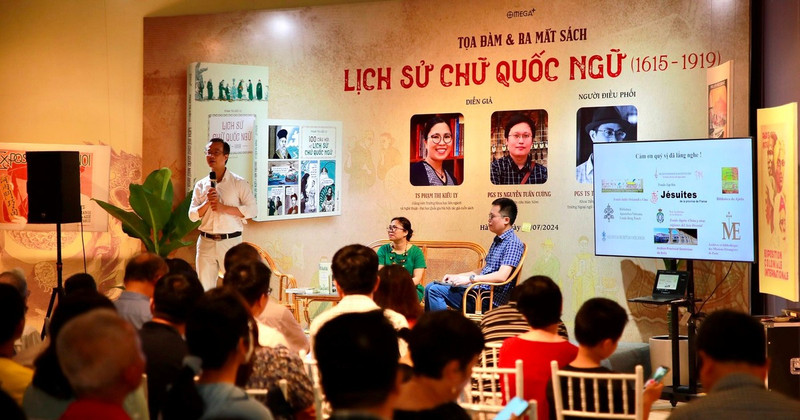

![[In Pictures] Procession of giant “Lord Pigs” weighing over 200kg at La Phu Village Festival](https://en-cdn.nhandan.vn/images/9f233ae74386156ace55673ec5a8ea373e7bb5df2274800bfd51bda6ec86d946ac1c392948518c6b0493c4028e062086d61e162f1bde5f06b033cfb48e75970298e3f24f2e8ecbfa7996f109382f9907/ruoc-lon-la-phu-11-4212.jpg.webp)
